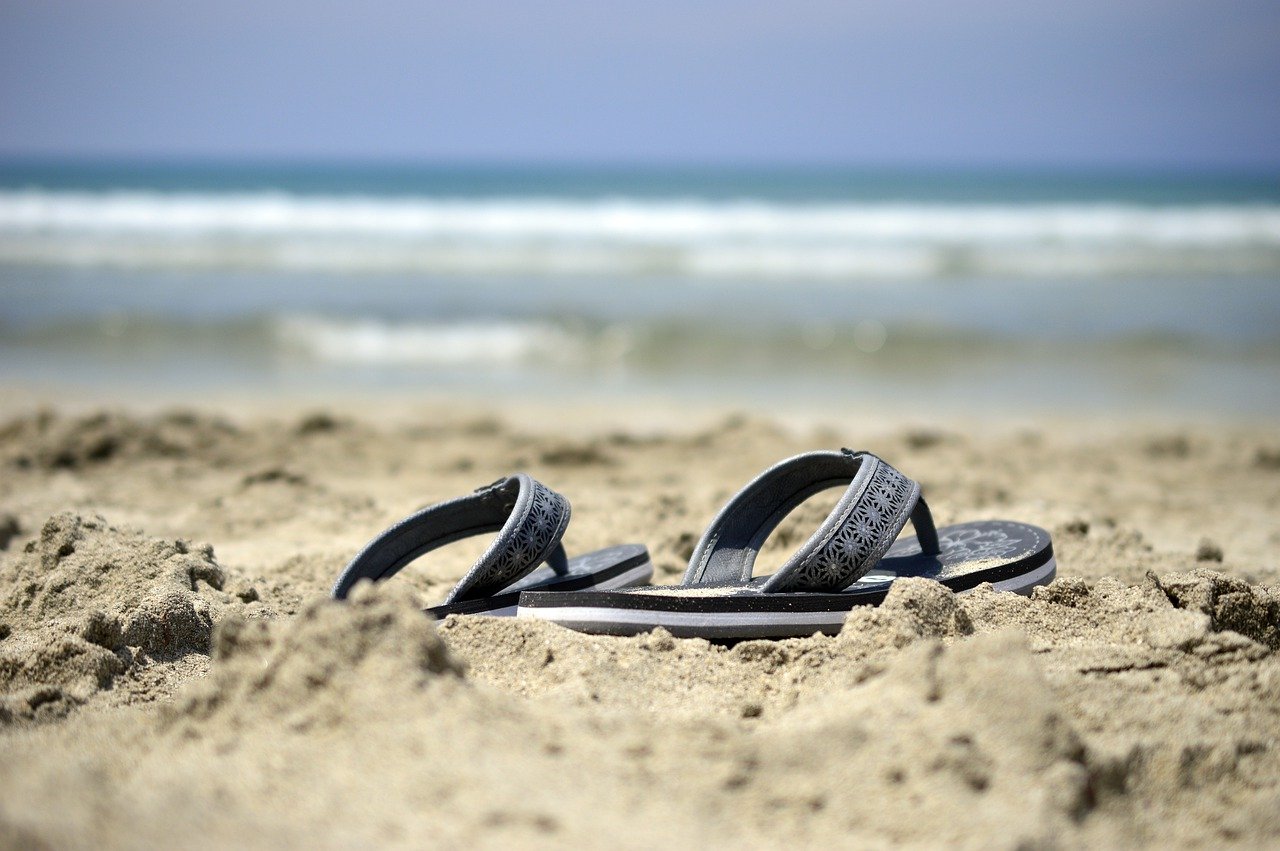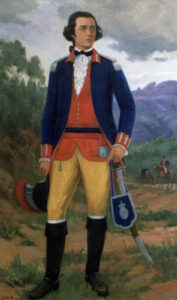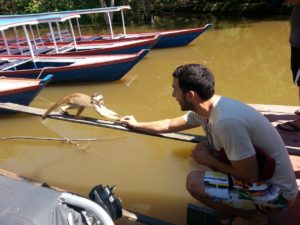As Roupas: Clothes in Portuguese
In this post we’ll learn lots of vocabulary to help you talk about clothes in Portuguese. First we’ll learn the basics with a lot of general vocabulary for clothes in Portuguese. Then we’ll learn vocabulary for professional and formal clothing. After that we’ll look at vocabulary for clothes that you’d wear in cold or hot weather. After that we’ll learn Portuguese vocabulary for shoes and then underwear. Finally we’ll learn Portuguese vocabulary for talking about how clothes fit and look, as well as things like fabrics and patterns. Ready?
General Vocabulary for Clothes in Korean
Let’s start with the basics: as roupas (clothes); a camisa (a shirt); a calça (pants); o jeans / a calça jeans (jeans); uma camiseta (a tee shirt); um cinto (a belt); usar (to wear); vestir-se (to get dressed); despir-se (to get undressed); vestir / por uma camisa (to put on a shirt), tirar uma camisa (to take off a shirt).
- Estou usando uma camisa preta.
I’m wearing a black shirt. - Estou usando uma camisa branca.
I’m wearing a white shirt. - Eu sempre uso jeans no fim de semana.
I always wear jeans on the weekend. - Estou usando jeans e uma camiseta.
I’m wearing jeans and a tee shirt.
- Este jeans está grande demais. Preciso de um cinto.
These jeans are too big. I need a belt. - Estou vestindo / pondo uma camisa.
I’m putting on a shirt. - Estou tirando meu jeans.
I’m taking off my jeans. - Eu me visto todas as manhãs.
I get dressed every morning. - Eu tiro minhas roupas antes de ir para cama.
I take my clothes off before bed.
Professional and Formal Clothes in Korean
Now let’s look at some more vocabulary for less casual clothing: um vestido (a dress); uma saia (a skirt); uma blusa (a blouse); um terno masculino (a man’s suit); um conjunto feminino (a woman’s suit); uma gravata (a tie); um paletó (a suit jacket); um smoking (a tuxedo); um vestido de noiva (a wedding dress).
- Que blusa bonita!
What a pretty blouse! - Ela geralmente usa uma saia e uma blusa para trabalhar.
She usually wears a skirt and a blouse at work. - Ela está usando uma saia preta e uma blusa branca.
She’s wearing a black skirt and a white blouse. - Ele geralmente usa um terno com uma gravata para trabalhar.
He usually wears a suit and tie at work. - O vestido vermelho dela é lindo!
Her red dress is beautiful. - Ele tem muitos ternos azuis.
He has a lot of blue suits. - É um evento formal, então ele vai usar / está usando um smoking.
It’s a formal event, so he’s going to wear / is wearing a tuxedo. - A noiva está usando um vestido de noiva lindo.
The bride is wearing a beautiful wedding dress. - Que cor de gravata você vai usar com aquele paletó?
What color tie are you going to wear with that jacket?
Cold Weather Clothes in Portuguese
Now let’s look at some clothing you may wear when it’s cold: uma malha de lã / um suéter (a sweater); um moletom / uma blusa de moletom (a sweatshirt); um casaco (a coat); uma jaqueta (a jacket); as luvas (gloves); as mitenes (mittens); um cachecol (a scarf); um chapéu (a hat); um casaco de chuva (a raincoat); um guarda-chuva (an umbrella); um moletom hoodie / moletom com capuz (a hoodie).
- Está frio! Estou usando uma malha de lã / um suéter.
It’s cold! I’m wearing a sweater. - Eu uso uma malha de lã quando está friozinho.
I put on a sweater when it’s chilly. - Você pode me emprestar um hoodie?
Can I borrow a hoodie? - Vou trazer minha jaqueta. Talvez faça frio à noite.
I’m going to bring my jacket. It may be chilly tonight. - Ele sempre usa uma jaqueta jeans / uma jaqueta de couro / uma jaqueta de motociclista.
He always wears a jeans jacket / a leather jacket / a motorcycle jacket. - Eu uso um casaco, um chapéu e um cachecol quando está frio.
I wear a coat, a hat, and a scarf when it’s cold. - Não vai esquecer suas luvas / mitenes.
Don’t forget your gloves/mittens. - Você vai precisar de um chapéu hoje.
You need a hat today. - Está frio no meu apartamento, então estou usando um moletom.
It’s cold in my apartment, so I’m wearing a sweatshirt. - Está chovendo, mas não tenho um guarda-chuva.
It’s raining, but I don’t have my umbrella. - Vou usar um casaco de chuva hoje.
I’m going to wear a raincoat today.
Hot Weather Clothes in Korean
When the weather is hot, you probably want to know how to say: o shorts (shorts); um maiô (a bathing suit); o calção de banho (swimming trunks); um biquíni (a bikini); uma (camiseta) regata (a tank top); os óculos de sol (sunglasses); um boné de beisebol (a baseball cap).
- Está calor! Estou usando shorts.
It’s hot! I’m wearing shorts. - Está muito calor hoje, então vou usar shorts.
It’s really hot today, so I’m wearing shorts. - Uso um maiô quando vou à praia / à piscina.
I put on a bathing suit when I go to the beach/pool. - Ele está usando um calção de banho, e ela está usando um biquíni.
He’s wearing swimming trunks, and she’s wearing a bikini. - Ele sempre usa uma regata no verão.
He always wears tank tops in the summer. - Está fazendo sol. Você precisa dos seus óculos de sol?
It’s sunny. Do you need your sunglasses? - Eu sempre uso um boné de beisebol.
I always wear a baseball cap.
Shoes and Footwear in Portuguese
Now let’s look at some footwear: os sapatos / os calçados (shoes); as meias (socks); os tênis (sneakers); as sandálias (sandals); as havaianas / os chinelos de dedos /as sandálias de dedos (flip-flops); as botas (boots); os chinelos (slippers); os saltos (heels); os saltos altos (high heels); os cadarços (shoe laces).
- Preciso de sapatos novos.
I need new shoes. - Ele está usando sapatos de couro preto.
He’s wearing black leather shoes. - Ela geralmente usa salto alto para trabalhar.
She usually wears heels to work. - Eu sempre uso tênis no fim de semana.
I always wear sneakers on the weekend. - Eu uso havaianas / chinelos / sandálias de dedos na praia.
I wear flip-flops at the beach. - Eu geralmente uso sandálias no verão.
I usually wear sandals in the summer. - Por favor, tire os seus sapatos e use chinelos dentro de casa.
Please take your shoes off and put on slippers in the house. - Uso botas quando está nevando.
I wear boots when it’s snowing. - Ponha seu tênis e vamos jogar basquetebol.
Put on your sneakers and let’s go play basketball. - Cuidado! Seu sapato está desamarrado.
Be careful! Your shoe laces are untied.
Underwear in Portuguese
Now let’s look at vocabulary for what you wear under everything else: as roupas íntimas / as roupas de baixo (underwear); as calcinhas /as cuecas (underpants); uma camiseta de baixo (an undershirt); as cuecas samba-canção (boxers); as calcinhas (panties); um sutiã (a bra).
- Eu preciso comprar roupas de baixo novas.
I need to buy new underwear. - Preciso lavar roupas, não tenho mais nenhuma calcinha / cueca limpa.
I need to do laundry, I don’t have any clean underpants. - Ela usa um sutiã e uma calcinha.
She wears a bra and panties. - Ele sempre usa cuecas samba-canção.
He always wears boxers. - Eu durmo de cueca samba-canção e uma camiseta de baixo.
I sleep in boxers and an undershirt.
Talking about How Clothes Fit in Portuguese
Here’s some vocabulary that you can use to talk about clothing:
- Que número de sapato você calça / usa?
What size shoe do you wear? - Você usa pequeno, médio, grande ou extra grande?
Do you wear a small, a medium, a large, or an extra-large? - Esta camisa está grande/pequena/apertada/ solta demais.
This shirt is too big/small/tight/loose. - Esta calça não serve em mim.
These pants don’t fit. - Este tênis serve muito bem.
These sneakers fit very well. - Esta malha de lã é quente e confortável.
This sweater is warm and comfortable. - Estes sapatos machucam meus pés.
These shoes hurt my feet! - Aquela jaqueta combina bem com você.
That jacket looks really good on you. - Aquela calça não combina com você.
Those pants don’t look good on you. - Aquela camisa não combina com esta calça.
That shirt doesn’t match those pants.
Fabrics and Patterns in Korean
Finally, let’s look at some vocabulary related to fabrics, designs, and more: o algodão (cotton); a seda (silk); a lã (wool); o couro (leather); as listras (stripes); as bolinhas (polka dots); a estampa (pattern); um botão (a button); de manga curta (short-sleeved); de manga comprida (long-sleeved); um zíper (a zipper); uma fivela de cinto (a belt buckle).
- Amo este tecido!
I love this fabric! - Eu gosto da camisa listrada.
I like the striped shirt. - A blusa dela tem uma estampa floral.
Her blouse has a floral pattern. - Ela está usando uma blusa de bolinhas.
She’s wearing a shirt with polka dots. - De que tecido é feita esta camisa?
What fabric is that shirt made of? - Eu só uso algodão.
I only wear cotton. - Minha malha de lã é bem quente.
My wool sweater is very warm. - Esta blusa de seda é linda, mas cara!
The silk blouse is beautiful, but expensive! - Você está usando uma camisa de manga curta ou uma camisa de manga comprida?
Are you wearing a short-sleeved shirt or a long-sleeved shirt? - Meu botão caiu!
My button came off! - Seu zíper está aberto!
Your zipper is open!
Get on the road to speaking Portuguese with the Language Garage!
We hope you’ve enjoyed learning how to talk about clothes in Portuguese. If you’d like to learn more:
- Create a free Language Garage account to access tons of Portuguese vocabulary, grammar, and culture.
- Follow us on Facebook, LinkedIn, BlueSky, Twitter, Threads, Mastodon, Instagram, or Pinterest. We publish lots of Portuguese vocabulary, grammar, and culture notes, so it’s a great way to pick up some new vocabulary and practice.
- Check out our other posts on Portuguese language, culture, and more.
- Enroll in affordable, flexible, and personalized private online Portuguese lessons or sign up for a small group online Portuguese class.
Image by Peggychoucair from Pixabay






